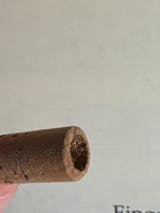Daily Maintenance / Tips
Soak Your Reed Before Playing
 Before playing soak your bassoon reed in water whilst you put your bassoon together. This will help the reed to be ready to play & to last as long as possible. We suggest always having a reed water cup in your case so that you are always able to soak your reeds no matter where you are.
Before playing soak your bassoon reed in water whilst you put your bassoon together. This will help the reed to be ready to play & to last as long as possible. We suggest always having a reed water cup in your case so that you are always able to soak your reeds no matter where you are.
Clean Your Bassoon with a Swab After Playing
Cleaning your bassoon after every playing is very important as it removes any saliva & debris that may have built up. You only need to clean two joints, the wing & boot joints, using separate specially made wing joint swabs and boot joint swabs. Cleaning your bassoon helps avoid the wood of the instrument rotting (although bassoons are now quite resistant to this) & it means that you won't have your bassoon making popping sounds when you next go to play it, which is always a good thing!
Occasionally, you may need to empty the collected water from the boot joint of your bassoon when doing this is it important to tip out the water through the smaller hole (the one where the wing joint connects).
Don't Leave Your Instrument Laying Flat
When you have a break or have quite a few bars rest try not to leave your instrument flat, or even worse, with the top of the bassoon lower than the bottom. This will lead to water entering tone holes and and other areas where water is not intended to go & can mean that your bassoon will start making popping noises (which often happens when you have an exposed solo!). Instead try to rest your bassoon on the floor and raise the top of the instrument slightly by putting something underneath the bell joint. Otherwise you could put your bassoon on a sturdy bassoon stand.
Fortnightly Maintenance
Clean Your Crook / Bocal
Soak your crook in some hot water for a few minutes and then pull a crook brush or crook swab through the crook every fortnight or so. This helps to keep your crook free of dirt and ensures that your crook works well.
I made the mistake, when I was a lot younger, of not cleaning the crook for a long time and when I finally did it was like playing a fantastic new instrument... keep it clean!
Check that the Bassoon Tenons Aren't too Stiff to Move
Check to see if the bassoons tenons (joints) are stiff to move when putting them together and taking them apart. If they are put some cork grease on the cork and the ends of the joints to loosen them up a bit - don't put too much though as you don't want the bassoon to slide apart in your hands.
For the More Fussy Cleaners...
Polish the Keywork in 5 Minutes
Using a impregnated silver polishing cloth briefly polish your instrument. We suggest you do no more than 5 minutes of polishing ever two weeks so the silver isn't worn away. Never use liquid silver polish as this is very abrasive and will cause noticeable damage after prolonged use.
Brush the Dust off the Bassoon
Using a natural hair paint brush brush all the dust off the instrument, especially focusing on the areas where there is a lot of keywork. It is important to use a natural hair paint brush as most other types of paint brush are likely to slightly scratch the surface of the instrument.
Irregular Maintenance
Clean the Nipple of the Crook / Bocal
Very carefully and gently poke a piece of thin wire (reed making wire) through the small hole on the crook, otherwise known as the nipple, to ensure it is free of dirt. Then pull a crook brush or crook swab through the crook.
Oil the Springs of the Instrument
Springs on every woodwind instrument keep all the keys moving and so it is important to look after them as they have to endure alot. Every now and then you need to oil the springs on the bassoon with special spring oil. To do this apply the oil, using the needle applicator, to the part of the spring which rests on a piece of keywork. This helps to prevent corrosion occurring and will also make the bassoon slightly quieter.
If you have any questions about any of the above please pop me an email to matthew@crookandstaple.com and I'll try my best to help!
This Article Was Written / Collated By
|
|
Bassoonist at Crook and Staple |





